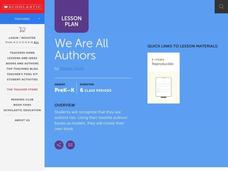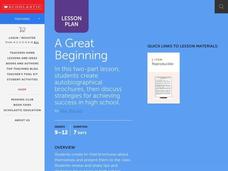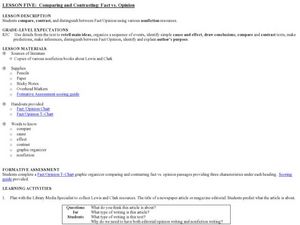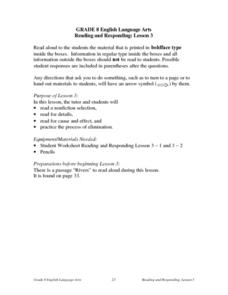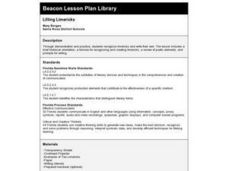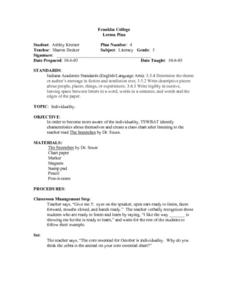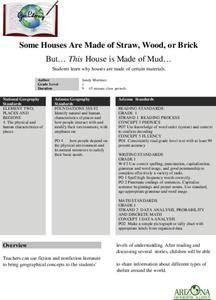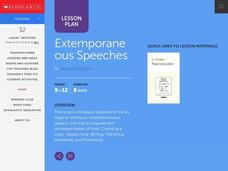Curated OER
Reading And Responding: Lesson 15 Nonfiction
Eighth graders examine a nonfiction selection in a teacher led lesson plan. They examine the author's purpose for writing the selection and identify the difference between fact and opinion. The compare and contrast expository and...
Curated OER
We Are All Authors
Read and discuss a variety of books by different authors and have your class create their own book. They will identify the different parts of a book, then using a story they have already written, they enter their story and information...
Curated OER
Introduce Vocabulary: Dinosaur Bones (Barner)
Dig into some prehistoric vocabulary in Bob Barner's informative book Dinosaur Bones. This works best if you introduce the primitive words before reading the story. These are the focus terms in the text: ancient, climate, extinct,...
Curated OER
A Great Beginning
Check out this detailed resource for some beginning of the year activities. After examining examples, class members uses the computer lab to create a personal brochure enhanced with clip art or photos to introduce themselves to the...
Curated OER
Comparing and Contrasting: Fact vs. Opinion
Elementary schoolers investigate nonfiction stories by analyzing facts and opinions. They read nonfiction stories about the Lewis and Clark expedition. Pupils utilize a T-chart to list the facts and opinions on opposite sides, and then...
Curated OER
Genres, Genres Everywhere
Young readers assume the role of Genre Sleuths to investigate the characteristics of folktales, fantasies, and mysteries. For this session you will need to collect a variety of books on a topic you have been studying. Groups then examine...
Curated OER
Haiku Poetry
Third graders write their own haiku poem after a lesson plan on the history and format of a haiku. In this poetry lesson plan, 3rd graders write a haiku with the correct lines and symbols.
Curated OER
What is a Biography?
Investigate biographies with your class. Compare autobiographies and biographies of Martin Luther King, Jr. as an example. Learners explore the factual components that make up a biography and locate several biographies of notable...
Curated OER
Reading and Responding: Lesson 3
Reinforce comprehension of informational text. This is a one-on-one lesson intended to build an internal dialogue the reader can use to boost overall comprehension. They work independently with a tutor or teacher to read a nonfiction...
Curated OER
Introducing Biographies - Getting to Know You
Students explore several different types of biographies to determine their area of interest, choose one notable person they would like to explore, complete online tutorial on biographies, and use written and Internet resources to...
Curated OER
Analyzing the Use of Irony in a Short Story
Ninth graders examine how literature connects to real-life and see how irony aids in the development of theme. They read Shirley Jackson's The Lottery, and discuss elements of foreshadowing and situational irony. Then learners will write...
Curated OER
Exploring Arizona's Biotic Communities Lesson 1: Mapping Biotic Communities
As part of a unit on Arizona's biotic communities, young ecology learners create a map. They describe how humans and animals adapt in their habitat. They take notes and create graphic organizers from articles they read. Beautiful maps,...
Curated OER
Self-Monitoring Strategies and Vocabulary Games
Middle and high schoolers identify how to discover a word's meaning by exploring context clues and any pictures, diagrams, photographs, and charts that might be included. They continue this process with other examples and locate one on...
DeKalb County Schools
Compare/Contrast
A series of reading activities is sure to engage your young readers! Based on comparing and contrasting ideas, the packet provides opportunities to compare characters, themes, texts, and other elements of fiction.
ReadWriteThink
Webcams in the Classroom: Animal Inquiry and Observation
Boost observational skills with an inquiry-based lesson that takes scholars on a virtual field trip. With help from webcams, learners observe animals in a zoo or aquarium. Observations go into a journal and a discussion is held to review...
Curated OER
How Logical is Garfield?
Third graders analyze comics found in the newspaper for samples of logical, emotional, and ethical appeal. They write a paragraph for each selected comic strip explaining how the comic strip represents the use of logic, emotions, or ethics.
Curated OER
Deduction
Young scholars investigate the linguistic devices used by writers to create meaning. In this writing lesson, students discover why writers write in different ways showing examples of different types of text. After reading each type young...
Curated OER
Lilting Limericks
Students discover the formula for writing limericks and use it to write their own poems.
Curated OER
Louisiana Cinquains
Students enhance their understanding of parts of speech by writing a cinquain poem about Louisiana. In this cinquain poem lesson, students read example cinquain poems and study the format for a cinquain poem. Students create a class poem...
Curated OER
Language Arts: What Makes an Individual
Third graders listen to the teacher read "The Sneetches" prior to creating charts about their individual characteristics. After numerous examples of individuality, they compile them on chart paper. As an extension, 3rd graders write...
Curated OER
Pre-writing activities for improving students' connections to literature
Students, while reading a novel together in class, jot in their journals any connections to their own lives they can make between the text and self, text to text or text to the world. Various themes are connected to open more doors to...
Curated OER
Adventures in Alice
Students create a haiku and illustrate it on the computer. For this haiku lesson plan, students review the history of the haiku while they are outside and then write their own. Students then use a computer program to illustrate their poem.
Curated OER
Some Houses Are Made of Straw, Wood, or Brick: But... This House is Made of Mud...
First graders read and discuss several stories. They share information about different types of shelter around the world. They explain that lifestyles and shelter depend very much on where people live and how they use the resources...
Curated OER
Extemporaneous Speeches
High schoolers perform the six steps of writing an extemporaneous speech including, choosing a topic, researching, writing, practicing delivering and processing.

